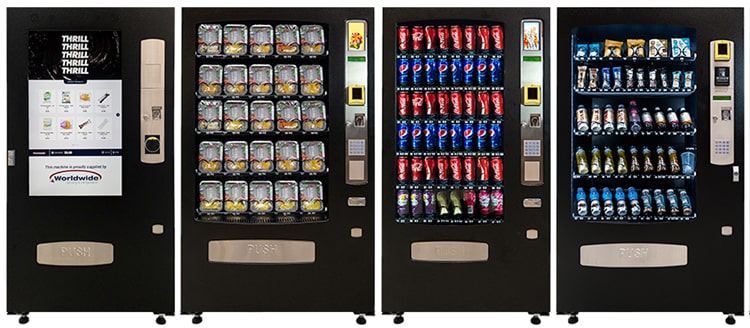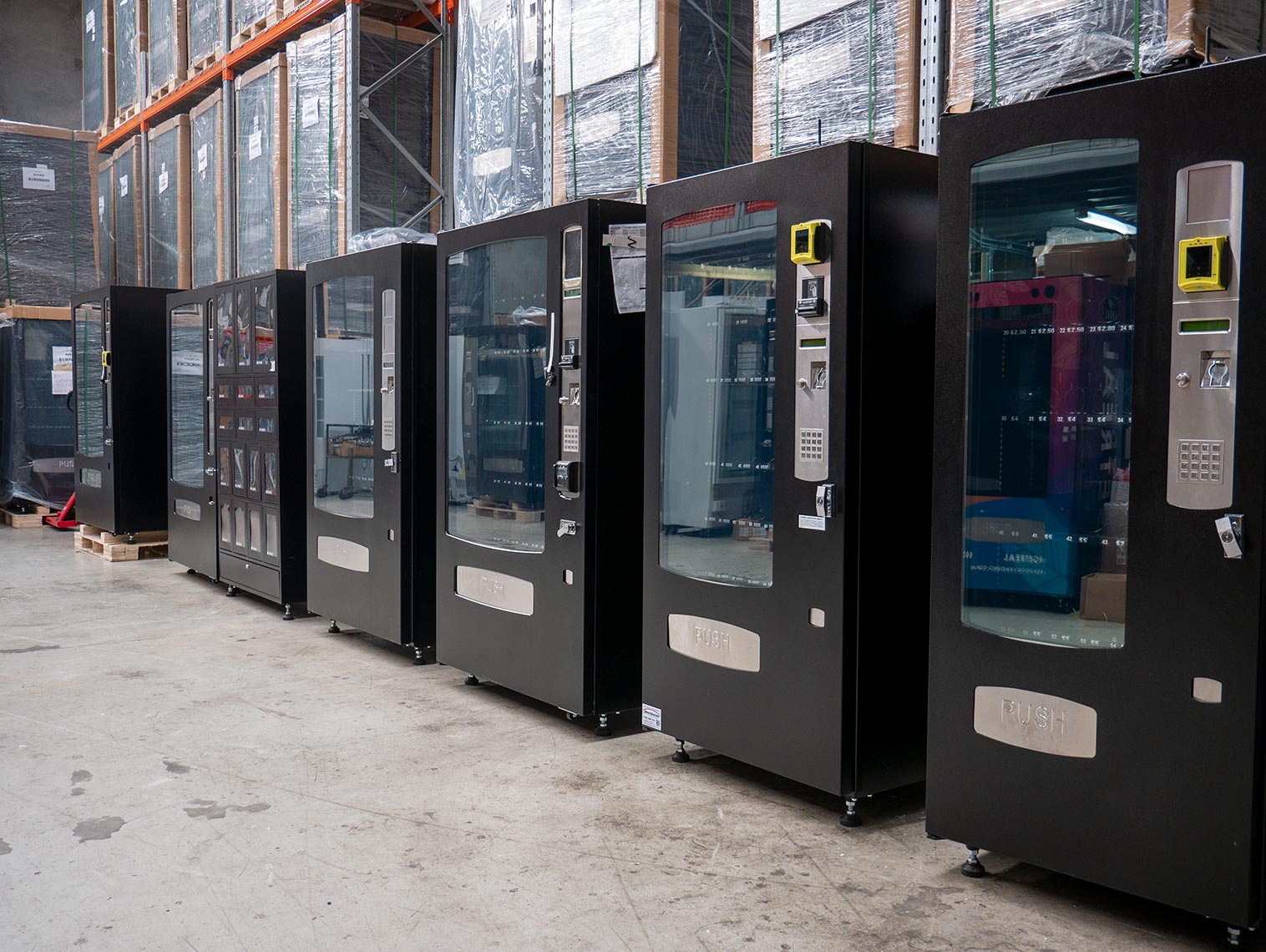 Starting your own vending machine business is an excellent way to generate passive income, build a scalable venture, and take advantage of the growing vending machine industry. With minimal overhead costs and flexible operations, vending machines have become a popular choice for entrepreneurs. This guide provides a detailed road map to help you start a profitable vending machine business, covering everything from initial investments to managing multiple machines.
Starting your own vending machine business is an excellent way to generate passive income, build a scalable venture, and take advantage of the growing vending machine industry. With minimal overhead costs and flexible operations, vending machines have become a popular choice for entrepreneurs. This guide provides a detailed road map to help you start a profitable vending machine business, covering everything from initial investments to managing multiple machines.
Perks of Starting a Vending Machine Business?
Owning your own vending business offers unique advantages that appeal to a wide range of entrepreneurs. The simplicity of the business model, combined with low operational costs, makes it an attractive opportunity. Unlike traditional retail businesses that require staff and significant space, vending machines are automated, cost-effective, and available 24/7 to customers.
One of the main reasons vending machines are profitable is their ability to meet customer needs conveniently. Whether placed in high-traffic locations like shopping malls, office buildings, or transit hubs, these machines cater to on-the-go consumers looking for snacks, drinks, or even speciality items.
Additionally, the scalability of this business model allows you to start with one vending machine and expand as profits grow. With the right strategy, you can eventually operate multiple vending machines in profitable locations, creating a steady revenue stream.
How Much Do Vending Machines Cost?
Understanding how much vending machines cost is crucial for planning your initial investment. In Australia, the price of an average vending machine typically ranges from $3,000 to $10,000 AUD, depending on the machine’s size, capacity, and features. Machines with advanced features, such as cashless payment systems, often fall on the higher end of this range.
If you’re on a budget, used vending machines or refurbished machines offer a more affordable entry point into the business. However, be cautious when purchasing second-hand equipment—ensure the machines are in good working order and comes from a reputable vending machine supplier.
In addition to the cost of the machine, you’ll need to factor in stock costs, permits, and insurance. For instance, stocking a large vending machine with snacks or beverages typically costs $200 to $800. Insurance, such as public liability and theft coverage, is essential for protecting your vending machine investment.
Legal Requirements for Starting a Vending Machine Business
Starting a vending machine business in Australia requires compliance with specific legal and regulatory obligations. The first step in setting up your venture is to register your business, which involves choosing a structure such as a sole proprietorship, partnership, or company. Obtaining an Australian Business Number (ABN) is mandatory, as it allows you to manage tax obligations and business transactions effectively.
A vending machine business requires additional permits depending on the type of products you sell. For example, vending machines offering food products often need local council approvals to ensure compliance with health and safety regulations. In Victoria, food vendors must register their machines with the council where they primarily operate. Similarly, mobile vending units, which move between different locations, may face more complex legislative requirements. Staying informed about these obligations is essential for avoiding legal issues, and consulting organisations like the Australian Vending Association can help you stay updated on industry standards and best practices.
Insurance is another critical component of a successful vending machine business. Public liability insurance offers protection in case of accidents or damages related to your machines, while product liability or indemnity insurance covers potential risks associated with the items sold. These safeguards are essential for mitigating financial risks and ensuring the long-term sustainability of your business.
If you plan to scale your operations and manage multiple machines, partnering with trusted vending machine suppliers, such as Worldwide Vending, can provide valuable insights and access to industry-standard practices.
Choosing the Right Vending Machine Options

The success of your business hinges on selecting the best vending machine options to meet the needs of your target market. Common types of vending machines include:
- Drink Vending Machines: These are ideal for locations like gyms, bus stations, and offices, offering products like energy drinks, sodas, and water.
- Snack Machines: Perfect for schools, shopping malls, and office buildings, these machines sell items such as chips, chocolate bars, and healthy snacks.
- Fresh Food Vending Machines: These machines offer fresh, perishable items like salads, sandwiches, and fruit, catering to health-conscious consumers and workplaces.
- Bulk Vending Machines: These smaller machines, often stocked with candy or gumballs, are a low-cost way to enter the vending machine market.
- Combination Vending Machines: These machines provide both snacks and drinks, giving customers more variety and increasing sales potential in locations with a broad customer base.
Each option has its pros and cons, so it’s important to match your machines to the preferences and needs of your customers. For instance, gyms might require healthy snacks, while office spaces may perform better with a mix of beverages and quick energy boosters.
Setting Up Your Vending Machine Business Plan
A vending machine business plan serves as the foundation for building a successful venture. This plan should outline every aspect of your operations, from the initial investment to long-term growth strategies. Key components include:
- Market Research: Conduct thorough research to identify profitable locations with high foot traffic. Analyze customer demographics to determine what products will perform best.
- Initial Investment: Estimate how much you’ll spend on purchasing or leasing machines, stocking products, and covering permits and management costs.
- Business Structure: Decide whether to operate as a sole proprietor or company, and register for an Australian Business Number (ABN).
- Scaling Strategy: Plan how to grow your business by adding more machines or expanding into new markets.
A detailed plan not only helps you stay organised, but also provides a road map for managing vending machine operators or securing funding through equipment financing.
How to Make Vending Machines Profitable
Making vending machines profitable involves careful planning, strategic placement, and consistent maintenance. The location of your machines is one of the most critical factors. High-traffic areas like shopping malls, office buildings, and schools tend to generate the highest sales.
Equally important is product selection. Stocking items that match the preferences of your target market ensures steady sales. For example, beverage vending machines in transit hubs should offer quick energy drinks and bottled water, while machines in schools might include healthy snacks.
Maintaining competitive pricing and keeping your machines in excellent condition are also essential. Customers are more likely to use machines that are clean, functional, and easy to operate.
Managing Your Vending Machines
Managing multiple machines requires efficient systems to monitor stock levels, track vending machine sales, and schedule maintenance. Many operators use a vending management system to streamline these tasks. These systems provide real-time data on machine performance, helping you respond to issues quickly and ensure seamless operations.
Restocking machines typically involves replenishing products every 7 to 10 days, depending on demand. Maintenance tasks, such as cleaning coin mechanisms and updating payment systems, are crucial for long-term profitability. Regular upkeep also helps prevent breakdowns, minimising downtime and lost revenue.
Expanding Your Vending Machine Business
Once you’ve established a solid foundation, scaling your own vending machine business becomes the next step. Reinvesting profits into new machines and exploring multiple locations allows you to grow steadily while maintaining control over operations.
Diversifying your offerings can also attract a broader customer base. For instance, adding speciality vending units or incorporating fresh food options can help you stand out in a competitive market. Collaborating with property managers or business owners can further secure premium placement opportunities.
Additionally, consider upgrading your equipment to include the latest features, such as touchscreens and app-based payment systems, to attract tech-savvy customers. These enhancements can boost sales and ensure your business remains competitive in the evolving vending industry.
Choosing the Right Supplier for Your Vending Machine Business
Selecting the right supplier is crucial for the success of your vending machine business. A reliable supplier ensures that you receive quality machines and support, which can directly impact your profitability and customer satisfaction.
One of the key factors in choosing a supplier is fair pricing. It’s important to find a supplier that offers competitive prices on vending machines. Keep in mind that cheaper options may compromise quality, so it’s vital to strike a balance between affordability and quality. When comparing prices from different suppliers make sure you are comparing “apples with apples” as the quality available from different suppliers may vary widely..
Another consideration is customer support. A supplier that has ample spare parts availability and that offers excellent support is invaluable, especially when you face operational issues or need repairs. Look for a supplier that provides clear communication, quick response times, and troubleshooting assistance. A supplier that’s accommodating and attentive to your needs will make managing your vending machines much easier.
Additionally, check their reputation. Research the supplier’s public profile by reading reviews, testimonials, and case studies. A supplier with positive feedback and a proven track record of customer satisfaction is more likely to be trustworthy and reliable. You can also ask fellow vending machine operators for recommendations based on their experiences.
Conclusion: Building a Successful Vending Machine Business
Starting your own vending business offers flexibility, scalability, and the potential for significant profits. By understanding how much vending machines cost, choosing the right vending machine options, and focusing on profitable locations, you can create a thriving venture.
Whether you’re managing a single unit or operating multiple machines across different sites, success lies in strategic planning, regular maintenance, and excellent customer service. With dedication and a clear vision, your own vending machine business can become a reliable source of income and long-term growth.





